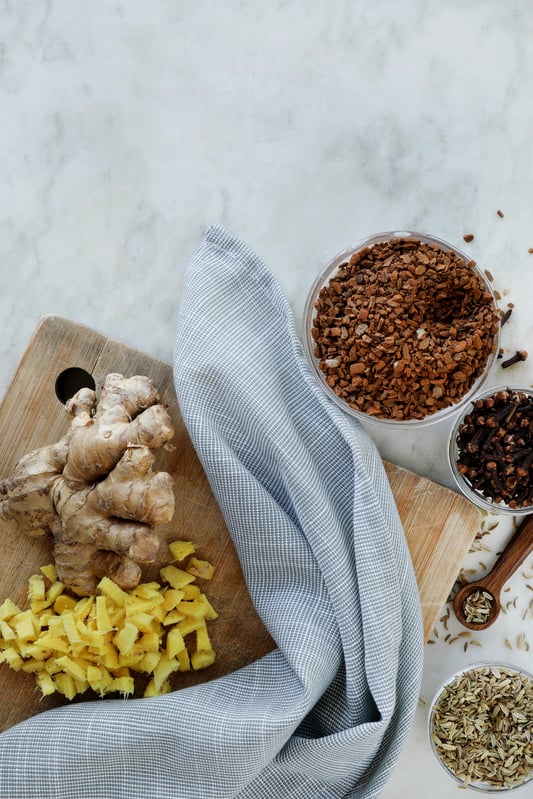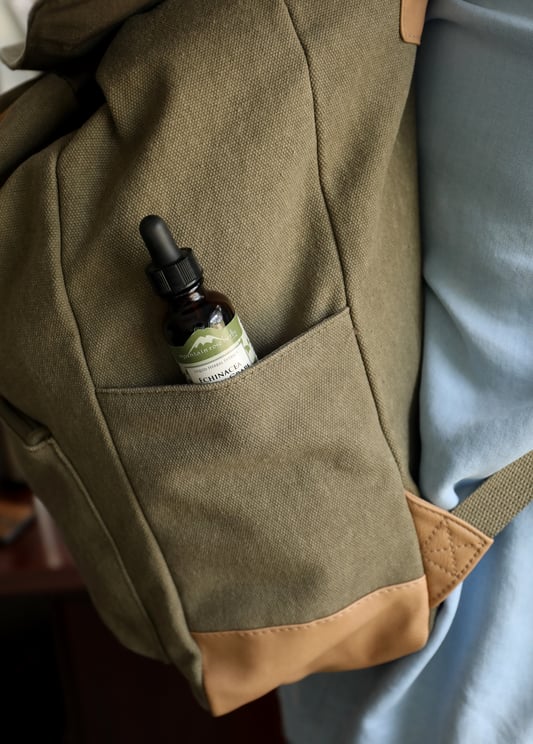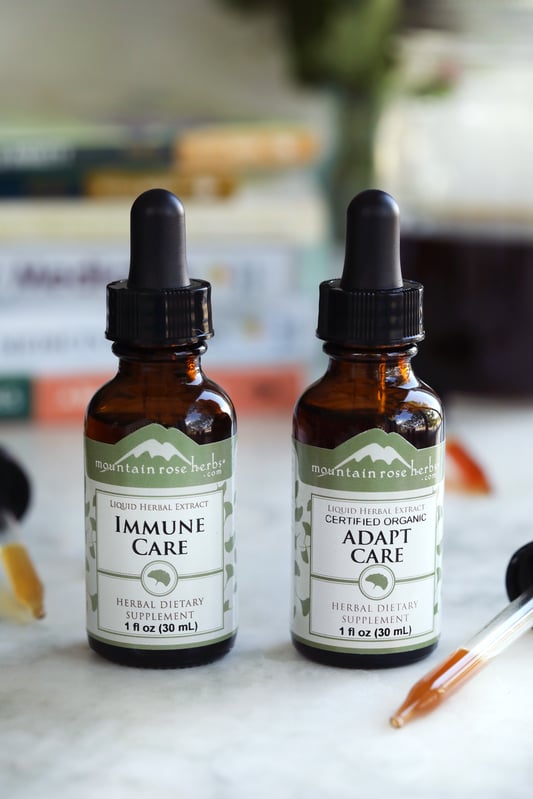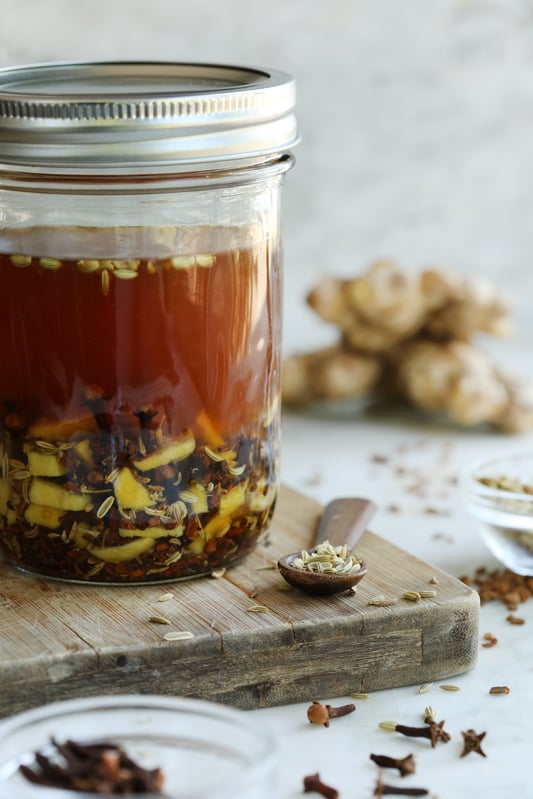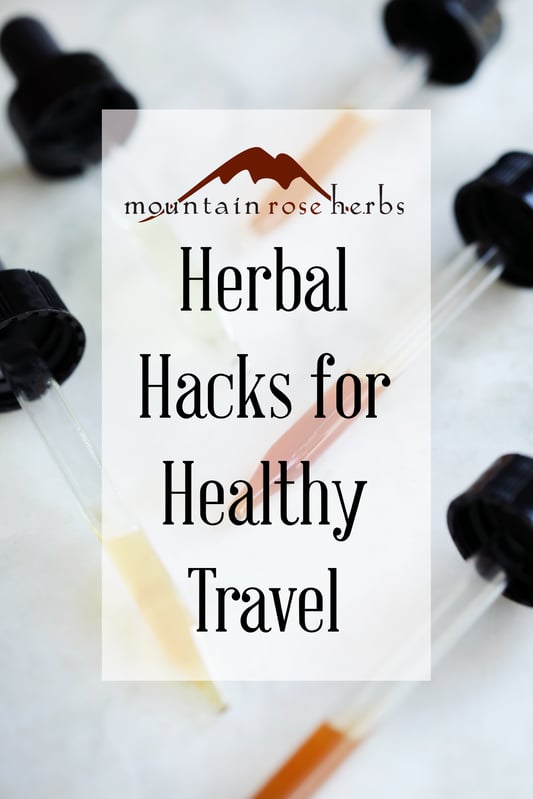I absolutely love to travel, and I painstakingly research and plan for my trips. However, mixed with all the eager anticipation of an upcoming adventure looms the fear of illness ruining my vacation. I think we have all had that experience where you take your seat on the plane and get settled, only to discover that someone near you has a hacking cough and looks like death warmed over. I find myself holding my breath and repeating, “I will NOT get sick,” over and over in my head. Thankfully, we can do more than just hope for the best—we can utilize wellness-supporting herbs before, during, and after traveling so we can make the most of our trip.
There are a lot of ways our bodies can become out of balance while traveling. Being exposed to germs when using public transportation; different sleep patterns or time zones; different altitudes and climates; and different water and food can all contribute to our feeling out of sorts. Being proactive with natural remedies and nutrition could possibly save your long-awaited vacation from ruin.
When I plan my trips, I also make an herbal support plan. Because I like to formulate and make my own tinctures, I create my schedules well in advance so that I have plenty of time to finish extracting tinctures before I travel (can you tell I am a bit of an obsessive planner?). When I am thinking about what herbs I will need for my trip, I consider where I am going and for how long I will be away. My plans always consist of an herbal preparation period of about two weeks prior to travel so I can ready my body for the upcoming changes. I also take teas or tinctures to support me while on the trip.
Natural Wellness Routine for Healthy Travels
Before You Travel
Two weeks prior to my trip, I start an herb regimen that will support my immune system so I don’t have to worry as much about catching something while on the airplane. I take my homemade immune support tincture, which is a combination of herbs that contain wellness supportive nutrients like vitamin C, including Echinacea, Oregon grape root, rose hips, and eleuthero. I take this tincture twice a day all the way up to travel day. I also avoid fast food and eat as healthy as possible. By fueling my body with proper nutrition and staying hydrated, I create a foundation of good health so I can start my trip on the right foot.
If your trip consists of hopping across several time zones, it is also very helpful to support natural sleep patterns by slowly cutting caffeine down and drinking more water. If there is less caffeine in your body, it’s easier to adjust to new sleep patterns in the new time zone.
In addition to making my tinctures and preparing my body to travel, I also like to pack herbs to take with me for common travelers’ complaints. Usually, this consists of a tincture or two and a bag with some individually wrapped tea bags. This will vary depending on where your travels take you, but I find it’s advisable to have things that are well labeled because different countries may have restrictions on unlabeled products. You don’t want to be held up at security for little baggies of unlabeled plant material or little brown bottles full of interesting smelling liquids!
Though I usually make my own tinctures and successfully fly with them domestically, I rarely take this chance when traveling internationally. For international travel, I usually take a couple of small bottles of tincture that I buy commercially. If there is ever any question as to what is in the tea or tincture, the label will detail the ingredients exactly, and commercially available products can easily be looked up online for verification if needed.
If, by some stroke of bad luck, security disposes of my herbal products, I like to be prepared with the name and contact information of an herb shop or herbalist at my destination. Being prepared will take the stress out of trying to find a new place, especially if you do not have access to the internet. Also, it’s sometimes great to visit these shops for fun and to see what local herbal treasures they offer.
During the Trip
While traveling, I expect to encounter the same issues that many travelers experience. The first is trouble sleeping. As I lie in bed after a busy day of exploring, I often find my mind busily reviewing the discoveries made or thinking about my upcoming itinerary. It’s nice to have some time to unwind with a nice, calming infusion. For this reason, I always bring chamomile tea with me. Chamomile is a pretty common tea that can sometimes already be found in your hotel room, but I find it's good to have with me just in case. Chamomile promotes relaxation and supports digestive health*. Additionally, the ritual of taking time to calm the mind is a comfort to me when staying in a different place, and it reminds me to breathe and be in the moment.
Because travel exposes us to new people, new germs, and new foods, I find that it’s important to continue to take herbs for immune support throughout the trip. Again, I bring my own tincture for this purpose, or find a similar commercially available formulation. I like Mountain Rose Herbs Immune Care Extract, because it has several adaptogens that help support the body worldly travels.
While we're on the subject of adaptogens, it’s a good idea to consider how the environment of an unfamiliar setting may affect your body. If you travel to a different hemisphere or latitude, you may experience an abrupt change in season. Similarly, altitude is an often-neglected consideration when planning for your trip, but a significant elevation change can put an unexpected damper on your travel plans. Changing altitude without giving the body adequate time to adjust can cause headaches, shortness of breath, and other feelings that can mimic a cold. Taking adaptogenic herbs can help your body be ready for these situations, including the general stresses of traveling. Adapt Care Extract is a great one to take while on your trip because of the variety of adaptogens used in the formulation.
Eating new and different foods is one of my favorite parts of traveling, but unfamiliar dishes and beverages can sometimes cause GI upset and discomfort. Gas, bloating, gurgling gut, and diarrhea can hamper vacation fun. I like to keep some mint tea on hand to help settle an upset stomach, and I also like to have a tincture handy for GI troubles. I find that tinctures are easy to take with me in my day bag while on the go. Herbal extracts also tend to be absorbed quickly, which allows me to dig in to my next round of delicious treats without much of a wait. Try Mountain Rose Herbs’ Tummy Care extract, or if you like making your own tinctures, try my recipe below. This tincture may also help to calm an unhappy tummy when traveling through rough skies or seas—another great reason to take it along on your travels!
Steady Stomach Travel Tincture
Ingredients
- 1 large, fresh, organic ginger root OR 1/2 a cup dried organic peppermint leaf
- 1/4 cup organic sweet cinnamon chips
- 1 Tbsp. organic whole cloves
- 1 Tbsp. organic fennel seeds
- Vodka or other grain alcohol
Directions (using the folk method)
- Peel and dice fresh ginger root.
- Place ginger root, cinnamon, cloves, and fennel seeds in a 16 oz. glass jar
- Cover with vodka or other grain alcohol, making sure the alcohol covers the herbs by 1 to 2 inches.
- Cover the jar with a layer of wax paper and then the jar lid.
- Store in a cool, dark place out of direct sunlight and leave for two weeks, shaking daily to blend.
- Taste tincture for desired strength. Infuse longer if necessary, but note that if left too long, it may become too strong.
- When ready, strain out herbs and bottle in a dark amber or cobalt glass dropper bottle.
- Take a dropperful or two when experiencing GI upset.
wHEN You get Home
Your herbal care should not cease as soon as you get home. After you return, you will likely have an adjustment period of settling back into your own time zone, climate, and even food. It’s a good idea to continue to use the herbs you brought on your trip for the very same reasons until you settle back in at home.
Healthy Travel Pro Tips:
- Check with your airline about any herbal restrictions
- Restrict tincture bottle sizes to 1 or 2 oz.
- If you are bringing an herb you take regularly, keep it with you in your carry on, just in case your bags are lost (again, clear labeling may help you avoid security woes!).
Want to find the right herbs for your wellness needs?
Use Our Guide to Basic Herbal Actions!
You Might Also Enjoy:
- Herbs for Digestion with Recipes
- How to Find a Qualified Naturopath or Herbalist
- 7 Ayurvedic Herbs for Vitality, Joy, and Peace of Mind
*This statement has not been evaluated by the Food and Drug Administration. This product is not intended to diagnose, treat, cure, or prevent any disease. For educational purposes only.

